Research Article 
 Creative Commons, CC-BY
Creative Commons, CC-BY
Inquisition into the Psychological Impact of COVID -19 on Northwestern State University of Louisiana Psychology Students during Fall 2020 Term
*Corresponding author: Charles R King, Department of psychology, Northwestern State University of Louisiana, USA.
Received: January 20, 2022; Published: February 08, 2022
DOI: 10.34297/AJBSR.2022.15.002117
Introduction
Like many other Universities, students at Northwestern State University navigated an overnight shift to at home, online learning; a dramatic transition that may have impacted student’s learning and well-being. The stress placed on students has left some struggling to manage their mental health during home quarantines, social distancing, and missed milestones such as graduation and program inductions. While mental health experts and researchers are still uncertain about the full extent of COVID-19 impact on the mental health of college-age students, some fear the population may be at high risk for psychological and emotional disorders. An important epidemiological concern is how student’s affective states and anxiety have undertaken change with the progression of the COVID-19 outbreak. This study explored student’s feelings and attitudes toward COVID-19 during the Fall 2020 term at Northwestern State University. The researchers conducted a qualitative study seeking to fully understand the context of research participant’s lives that ‘controlled’ and ‘reductive’ procedures of quantitative research tend to miss. The goal was to obtain a better understanding of what students are feeling and experiencing daily during the pandemic. Therefore, a qualitative approach was employed to provide a holistic understanding of the lives of the students [1]. The utilization of an exploratory design allowed the researchers to obtain pertinent information from students regarding attitudes and feelings and to formulate the grand tour questions for further studies on this topic. The outcome of a successful exploratory research project is to identify new, insightful, fruitful, and plausible ways to think about and explain reality [1] & (Table 1). In the quest to contextualize the psychological impact of COVID-19 on college students, the researchers believe further knowledge and understanding about attitudes and feelings of students are vital in evaluating current trends on campus. The researchers hope readers will view this study as a preliminary step toward building knowledge of factors along with developing and delivering programs to meet the deficits in resources for students. Milton Erickson’s quote serves as a catalyst for this study: “Until you are willing to be confused about what we already know, what you know will never grow, get better, or more useful” [2]. The researchers understand change is inevitable, and we live in a forever changing interconnected complex world; therefore, it is compulsory to evaluate consistently and adapt to keep up with changes.
Research Design
An exploratory qualitative design was employed to explore student’s feelings and attitudes toward the impact of COVID-19. One description of an exploratory study is exploring unfamiliar research questions to uncover generalizations and develop hypotheses that can be investigated and tested later with more precise and complex designs [3,4], the purpose of exploratory research includes the following: “to investigate little-understood phenomena; to identify and discover important variables; and, to generate hypotheses for future research” (p.78). Due to the scarcity of studies examining views and attitudes of students related to COVID-19, the researchers decided to use the exploratory research design primarily based on the opportunity to explore an area where little is known. The exploratory method provided students the opportunity to share their feelings and attitudes through reflective experience-based stories and day-to-day experiences.
Interview Protocol
To provide new insight regarding students experience during COVID-19, this study utilized the general interview guide approach strategy with semi-structured interview questions. According to Kvale [5], the guide approach ensures the same general areas of information are collected from each interviewee and allows a degree of freedom and adaptability in gleaning information from the interviewee. The rationale behind using a semi-structured interview technique was to explore the areas where the interviewee may perceive difficult to discuss and to tailor the questions appropriate for interviewing and to uncover the richness of the data. The duration of the interviews was between 15 to 30 minutes. Each participant was asked a total of six open-ended questions to elicit feedback regarding their feelings and attitudes.
Students were interviewed during school hours in the Northwestern State University psychology department. A total of n=32 interviews were conducted. Interviews were conducted via Webex and recorded using digital technology to maintain safe social distancing guidelines. The data from the interviews was coded and compared to data and feedback of other students. The data collected in raw and transcribed forms were kept anonymous, stored in a locked container accessible only to the principal researchers for three months and afterward destroyed. To establish credibility and dependability in this study, the researchers carried out the initial coding of data and develop a set of categories that constitute the preliminary findings. The set of categories was compared to the researcher’s set to establish the extent of overlap. The researchers then merge the two sets into one combined set. This research present minimal physical, psychological, and social risks to the participants. All information and responses provided by the students was kept confidential. No disclosure of the names of the interviewees in any form was identified. The participation of the respondents was voluntary, and the researchers informed the participant of the option to discontinue participation at any time.
Research Findings
The students interviewed in this study were psychology students who were enrolled in the Fall 2020 term at Northwestern State University. The grand tour questions were developed based on the researcher’s knowledge and experience working as professors at Northwestern State University. The questions asked, and the corresponding responses from each participant’s guided the coding of the text. Emerging concepts were extracted paragraphby- paragraph using the inductive analysis approach method of coding. The findings summarized the results that directly explored the themes emerged from the grand tour questions. Interviewees answered the grand tour questions which led to the emergence of four central categories. Throughout the interview process, the feeling of isolation and loneliness were recurring themes of expression by the students. The themes were intertwined and provided a synergistic impact on improving outcomes in the event the college is faced with a similar situation related to COVID-19.
Interview Process and Discussion
Through qualitative semi-structured interviews, open-ended questions were constructed to discover and explore a deeper understanding of emotional reactions to COVID-19 restrictions. Although the language of each question was modified to evoke the perspective of the participants, the primary inquiry and intention of the questions were to solicit responses based on feelings and attitudes of the psychology students at Northwestern State University. Each participant was encouraged to share their experience in their words to yield a richer, more authentic interview. Using a summary sheet, the researchers took memo notes to record impressions of primary themes or concepts. Transcription of the text of each interview included a line-by-line identification letter to sort the data by participant’s code with relevant notes.
Through analysis of data, the researchers developed a thematic interpretation of each interview. Analysis of each of the thirtytwo transcribed interviews included the search for the structural segments to identify the detail, variation, and relationship within the concepts. In an effort to condense the data, the interview transcripts were read several times to identify categories. Each chunk was broken down, examined, and assigned a letter that the researchers believed described the idea represented. After coding all thirty-two interview protocols and reaching consensus about the meaningful chunks and their appropriate labels, the data was reduced to a set of concepts. These concepts were compared and grouped by the coders according to major themes. For reliability purposes and to ensure that the researcher captured all possible meanings accurately each protocol was coded twice. After a rigorous and systematic reading and coding of the transcripts, specific themes were developed which captured the core messages of the participants. When new codes emerged, transcripts were reviewed and recoded to fit the newly established coding system. After categorizing the data, the data was examined for properties that characterize each category. Diagrams were used to focus on what was emerging from the text and linking student’s feedback. From the master list developed, the coding process created four summary categories that captured the key aspects of the themes in the raw data and the most important themes given the research objectives. Validation of the categories that arose from the data incorporated phrases and quotes within the explanation of each participant’s experience. Brief statements were constructed to reveal the primary sense of what was said by the interviewee. A descriptive label was attached to each group of statements to ensure the understanding of the qualification and seclusion in constructing each category.
Inevitably, the findings were shaped by the assumptions and experience of the researchers conducting the research and carrying out the data analysis. Towards the end of the process, no new themes emerged which suggested the identification of major themes was complete. Using the inductive approach to analyze the transcribed interviews, the following themes emerged from the data collected: social isolation caused a feeling of sadness among students, a general overall feeling that Northwestern State University administration did everything possible to make the transition run smoothly, a general likeness to the school, strong disliked of the Hyflex system, lack of resources personally to tackle the stressors, unsureness of how to handle the stressor related to COVID-19, an overall high stress level because of the uncertain of health and family health, and a fear of being face-to-face with other students at the beginning of Fall 2020. The following encompass the four major categories that highlight the main issues regarding feelings and attitudes from students regarding COVID-19 during the Fall 2020 term.
a) Feeling of Loneliness and Isolation
A strong and recurrent theme in students’ views of COVID-19 during the Fall 2020 term was a feeling of isolation. Most of the students reported they felt high level of loneliness. One of the students stated, “This was a very tough time for me.” Many studies have suggested that loneliness can wreak havoc on an individual’s physical, mental, and cognitive health. In one study by Horigian, et al. [6] there was evidence of increase loneliness since the arrival of COVID-19. In the survey of 1,008 people, roughly 65% of study participants reported increased feeling of loneliness since the declaration of COVID-19 as a pandemic. The result of this study is parallel with the results of the quotes received by students at Northwestern State University (Table 2).
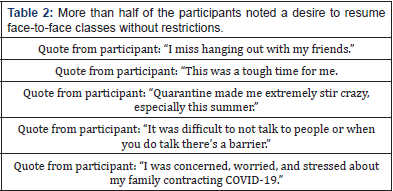
Table 2: Ice-breaker question: The researcher will ask students about their major and classification.
b) Stressor and Stress Related Issues
Another theme that emerged from the data was an increase in stress and stress related issues. For example, one of the participants told the story of being stressed out because she has one on campus class and another class 15 minutes later that mandated her to be online. Another student shared the story of experiencing stress due to anxiety and fear of their parents contracting COVID-19. Strongly stated throughout the interview process was stress related issues due to the uncertainty of the pandemic and changes. The participant’s responses indicate that they have some exacerbated stress that may have affected their performance in school. Although some of the students in this study sought the needed support and guidance, the current research data indicates that most of the students did not link to available resources.
The data research revealed that Fall 2020 term was indeed a stressful period for some of students in the psychology department. As noted, the transcribed quotes revealed that students were definitely concerned about their mental health and performance in school. When compared to the literature regarding impact of COVID-19 on students, a study conducted at Virginia College between April 20 to May 4, 2020, nearly three in four college students were combating anxiety, worry, or other challenges to their mental health because of COVID -19 (Table 3). This research identified stress and stressor as the key piece of the study from students. Many repeated findings in recent research on factors related to student’s mental health underscore the critical role support systems for stress related issues that students experience. It appears the interconnected themes that emerged in the text regarding students was related to stress. “Overwhelmed by stress, having little time to get to class, and being daunted by restriction and expectations,” were often mentioned by students as a recurring theme in this study.
c) Support from Northwestern State University Professors and Administrative Staff
When students were asked about the support from professors and administration at Northwestern State University, the data analysis indicated that most students believed that their professor and the administration at Northwestern State University were extremely accommodating and supportive during the Fall 2020 term. One student expressed that the transition worked because professors were empathic to the student’s needs. Another student mentioned that being able to have a Webex meeting with the professor was a plus. Programs offered in student services were also mentioned as a great resource for students. Nearly all participant’s comments were positive as it relates to the professor and administrative staff at Northwestern State University. When compared to literature, the researchers’ findings are very similar to those found by Lorvic, et al. [7] who found that all 33 of their participants, comprised of undergraduate nursing students currently attending the Faculty of Dental Medicine in Osijek, Croatia, were unanimous in their positive perception of their instructor’s encouragement, support, and understanding during the COVID-19 pandemic. The current findings are also somewhat in line with Mehmood, et al. [8] which found that of the 492 undergraduate medical student participants attending a medical school in Pakistan, 53.66% indicated that they felt supported by faculty with 42.5% indicating that they felt more supported during the transition to online learning than they had during traditional in person classes (Table 4).
d) Views Regarding the HyFlex Course Model
Another major theme that emerged from the data was related to the HyFlex Course Model. This single theme emerged from the analysis more than others and was discussed by more than half of the participants as a challenge due to technological difficulties. Most of the students commented on the inequity between being online and face-to-face instruction for classes during the Fall 2020 term. Students in the study addressed the need to improve the HyFlex Course Model. The HyFlex Model, according to one of the students was, “definitely not engaging and student friendly.” The same student stated, “The issue with technology made learning and staying focused extremely difficult.” It is important to note the goal of HyFlex is to allow students to have as much of an in-class experience as possible while balancing this with the need to reduce the overall in-person class size to facilitate social distancing. This was accomplished by having half of the class meet in person certain days a week while the remainder of the class attended virtually in a tele-conference style manner. Student’s alternate days in which they attend in-person and virtually Beatty [9]. Most students did comment on the interactive engagement as being an issue in the learning process. Another student recalled in a discussion-based class that they were unable to hear the discussion, only just the professor [10] & (Table 5).
Conclusion
There is no doubt that the COVID-19 pandemic had a tremendous impact on college students. The COVID-19 pandemic has forced college students across the country to socially isolate, leaving many feelings at least a little, and sometimes more than a little lonely. This study suggested that the feelings of isolation and loss contact with friends were key variables related to the impact of COVID-19 on students at Northwestern State University. This study further indicates that the HyFlex Model was not well received by the students due to technological issues and lack of stimulation. In particular the students were appreciative of their professors and the administration at Northwestern State University. Given the range of problems that students usually encounter pre-pandemic concerning mental health and stress, it appears that COVID-19 may have exacerbated them.
References
- Strauss A, Corbin J (1997) Grounded Theory in Practice, Thousand Oaks, CA: Sage Publications.
- Erickson M, Rossi E (2008) Collected Works of Milton H Erickson. The Nature of Therapeutic Hypnosis.
- Grinnell R, Unrau, Y (2005) Social Work Research and Evaluation Quantitative Approaches. Oxford New York: University Press.
- Marshall C, Rossman G (1989) Designing qualitative research. Newbury Park, CA: Sage.
- Kvale S (1996) Interviews: An introduction to qualitative research interviews. Thousand Oaks, CA: Sage Publications, Inc.
- Viviana E Horigian, Renae D Schmidt, Daniel J Feaster (2021) Loneliness, Mental Health and Substance Use among US Young Adults during COVID-19. Journal of Psychoactive Drugs 53(1): 1-9.
- Lovric R, Farcic N, Miksic S, Vcev A (2020) Studying during the covid-19 pandemic: A qualitative inductive content analysis of nursing student’s perceptions and experiences. Education Sciences 10(7): 188.
- Mehmood MS, Baig WS, Khan SA, Khan F, Awan SA, et al. (2021) Students perspective on online medical education during lockdown as a result of covid-19 pandemic. Journal of University Medical & Dental College 12(2): 111-118.
- Beatty BJ (2019) Hybrid-Flexible Course Design: Implementing Student Directed Hybrid Classes. Ed Tech Books.
- Wheaton G, Allison T (2020) Virgina College Student Shed Light on Challenges Related to COVID-19. State Council of Higher Education for Virginia.

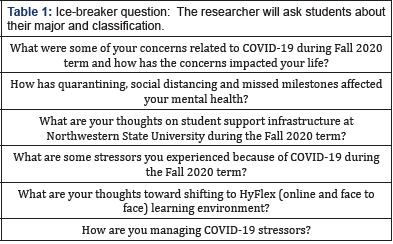
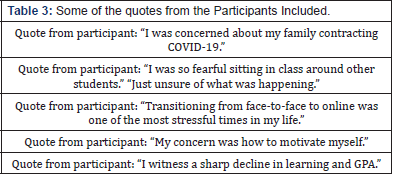
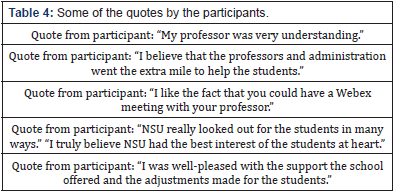
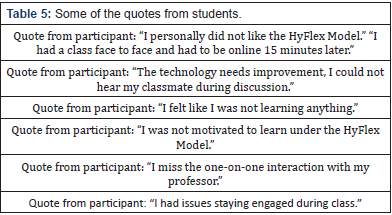


 We use cookies to ensure you get the best experience on our website.
We use cookies to ensure you get the best experience on our website.